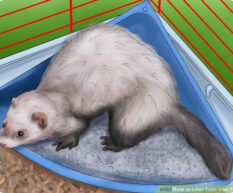Ferret News
What to expect as your ferret gets older
By Samantha Fixmer

Caring for your senior ferret
As we get older, our bodies and personalities change along with the passage of time. The same can be said about our amazing ferret friends. It’s documented that ferrets can live up to ten years. In the United States, they typically live for seven to eight years, and are considered to be geriatric at the age of three to four years. In Australia, six years of age is senior status for a ferret.
Signs of aging in the senior ferret
As with people, there are normal signs of aging for ferrets, including gradual vision loss (sadly we’ve yet to develop ferrety glasses), decreased agility and mobility, and gradual weight loss along with some muscle wasting and skin sagging. They may also experience hair thinning and loss, greying of their fur, and their masks becoming lighter. Cream and albino ferrets may begin looking more yellow-tinged. Another sign of a senior ferret is their increased need for sleep. This is a sign that may be commonly confused with lethargy, but there is a major difference to help you decipher between the two. An older ferret will sleep more, but when they are awake, they will be playful and relatively energetic. A ferret suffering from illness may be truly lethargic, in which case they will sleep more and also won’t be up to playing with you or their friends.
Aging ferrets may also experience diseases that are rarely seen in young ferrets. Abnormal signs to watch for are sudden weight loss, diarrhea, anemia, depression, dehydration, alopecia (hair loss), hypoglycemia (low blood sugar), coughing, hind leg paresis, distended abdomen, polyuria (increased urination), and polydipsia (increased eating). These can be symptoms of several common geriatric diseases that ferrets may develop as they age. To aid in early detection, a monthly review of your senior ferret, checking for any physical changes or abnormalities, is recommended. Biannual veterinary physical exams with at least yearly blood work are also prudent in early detection of possible neoplasia (cancer), gastrointestinal diseases, renal disease, cataracts, insulinoma, dental disease, and cardiomyopathy.
What you can do at home for your senior ferret
Regular exams and vet visits are not the only steps you can take toward caring for your senior. Within their cage, you can make changes so they’ll be comfortable in their retirement home. Decreasing the number of climbing levels, limiting the need to climb, and adjusting the ramps for easier climbing in their cages will lessen the chance for injury and reduce undue stress on the body. Regular rabies and distemper vaccinations are also recommended by some vets, though you and your vet will need to decide on an individual basis, weighing the benefits and risks for your ferret should they be ill or have a history of vaccine reaction. Another decision to be made is diet. A number of vets recommend switching to a lower protein-based diet. For example, if your ferrets are on a high-quality kitten kibble, then switch to the associated adult cat kibble and feed more frequently. Adjusting their protein intake will help protect their kidneys and possibly avoid the occurrence of renal disease.
Loving your senior ferret
Living with a senior ferret comes with so many concerns regarding their health and wellbeing, but if you provide cuddle time and a specific playtime for them, you will see how rewarding it truly is. These sweet babies just want to be with you, whether it be cuddled up in your lap while you watch a movie or perform some other sedentary activity, or dooking across the floor as you play with them and try to prevent them from nibbling your toes through your socks. Loving a senior ferret is a special experience.
Further reading
“Elderly Ferrets.” All About Ferrets. Updated in October 2015. https://www.all-about-ferrets.com/elderly-ferrets.html. Accessed 12 October 2019. (Web page)
Gruden, L. Vanessa. “Aging: Living with and Elderly Ferret.” Ferret Association of Connecticut. Published in February 2002. https://ferretassn.org/about-ferrets/health/routine-care/aging/. Accessed 12 October 2019. (Web page)
Hoppes, Sharman. “The Senior Ferret (Mustela Putorius Furo).” Veterinary Clinics of North America: Exotic Animal Practice, volume 13, issue 1. Published in 2010. Pages 107-122. (Scholarly article)
Pet Kare Clinic. “Ferret Senior Citizens and Their Special Needs.” https://petkareclinic.com/wp-content/uploads/2014/09/PKC-Ferret-Senior-Citizens.pdf. (Online PDF pamphlet)
“Special Needs of Older Ferrets.” The Animal Hospital. https://www.theanimalhospital.com/resources/health-topics/exotics-health-articles/special-needs-of-older-ferrets/. Accessed 12 October 2019. (Web page)




